An Analysis of Law and Religion in the Australian Context
VerifiedAdded on 2021/02/20
|10
|3114
|272
Essay
AI Summary
This essay examines the intricate relationship between law and religion in Australia, focusing on the concept of freedom of religion as enshrined in the Australian legal framework. It explores the constitutional protections afforded to religious practices and beliefs, highlighting the secular nature of the country and the separation between church and state. The essay delves into key legal principles and case studies, referencing the views of prominent legal scholars and their interpretations of Article 116 of the Australian Constitution. It analyzes the limitations and protections of religious freedom, the role of law in safeguarding cultural and religious aspects, and the balance between individual religious rights and societal interests. The essay further discusses the government's stance on religious matters, emphasizing the importance of maintaining a balance between law and religion to protect citizens and uphold the principles of justice and equality. The analysis includes the perspectives of various authors and their interpretations of the legal and religious nature of Aboriginal customary law and the need to respect religious diversity in a democratic society. The essay concludes by underscoring the importance of religious freedom and the necessity of upholding the laws to maintain harmony and balance within the society.
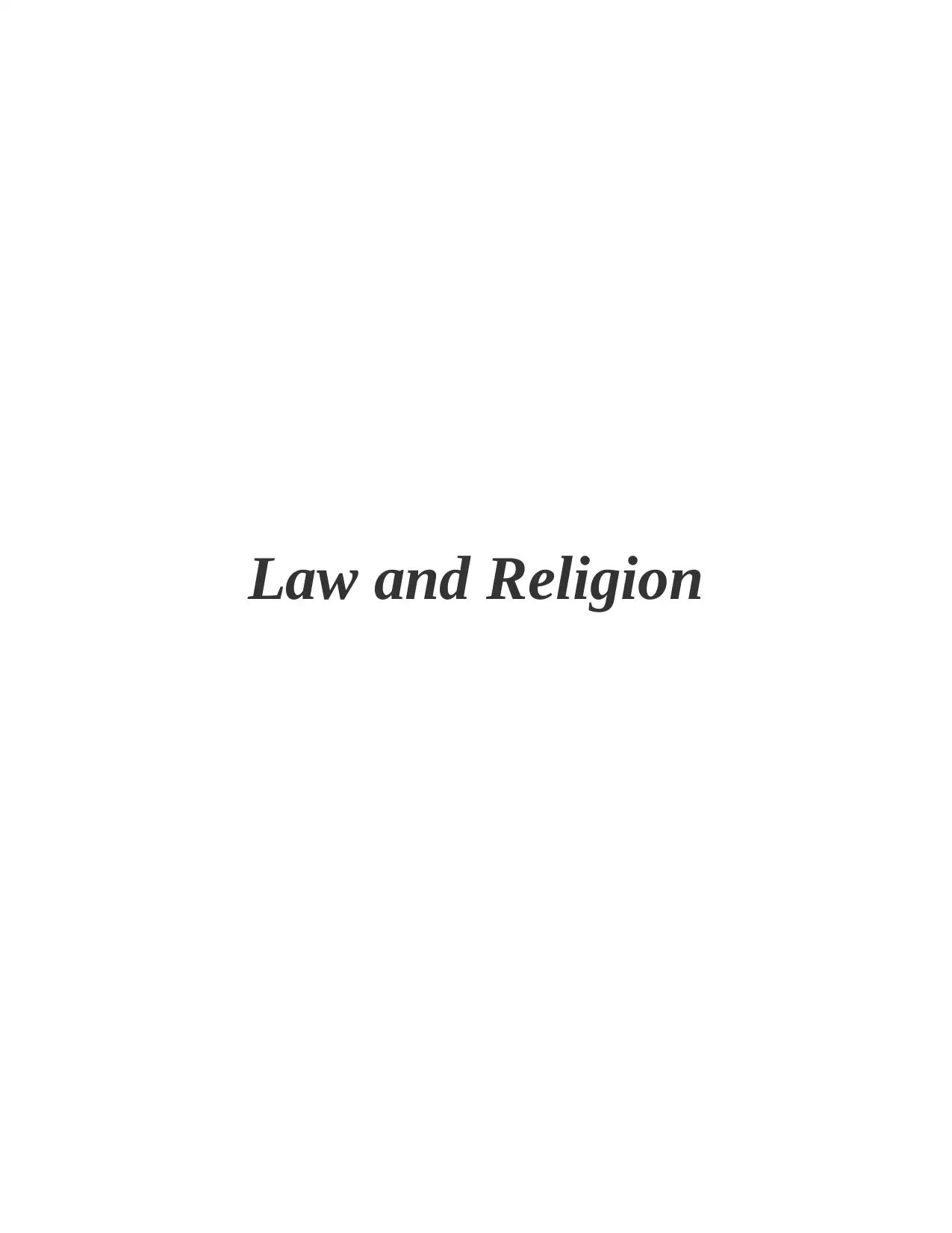
Law and Religion
Paraphrase This Document
Need a fresh take? Get an instant paraphrase of this document with our AI Paraphraser
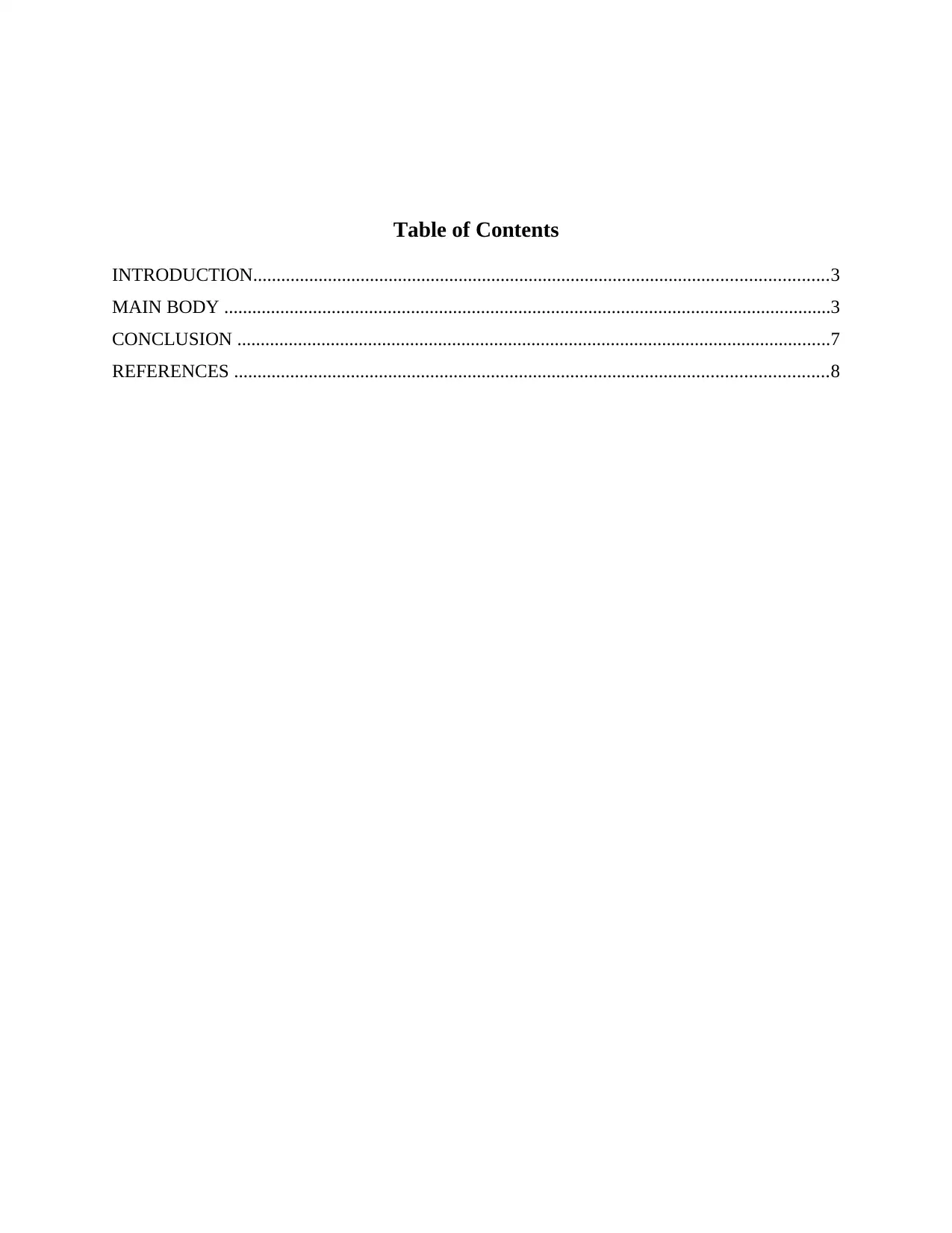
Table of Contents
INTRODUCTION...........................................................................................................................3
MAIN BODY ..................................................................................................................................3
CONCLUSION ...............................................................................................................................7
REFERENCES ...............................................................................................................................8
INTRODUCTION...........................................................................................................................3
MAIN BODY ..................................................................................................................................3
CONCLUSION ...............................................................................................................................7
REFERENCES ...............................................................................................................................8
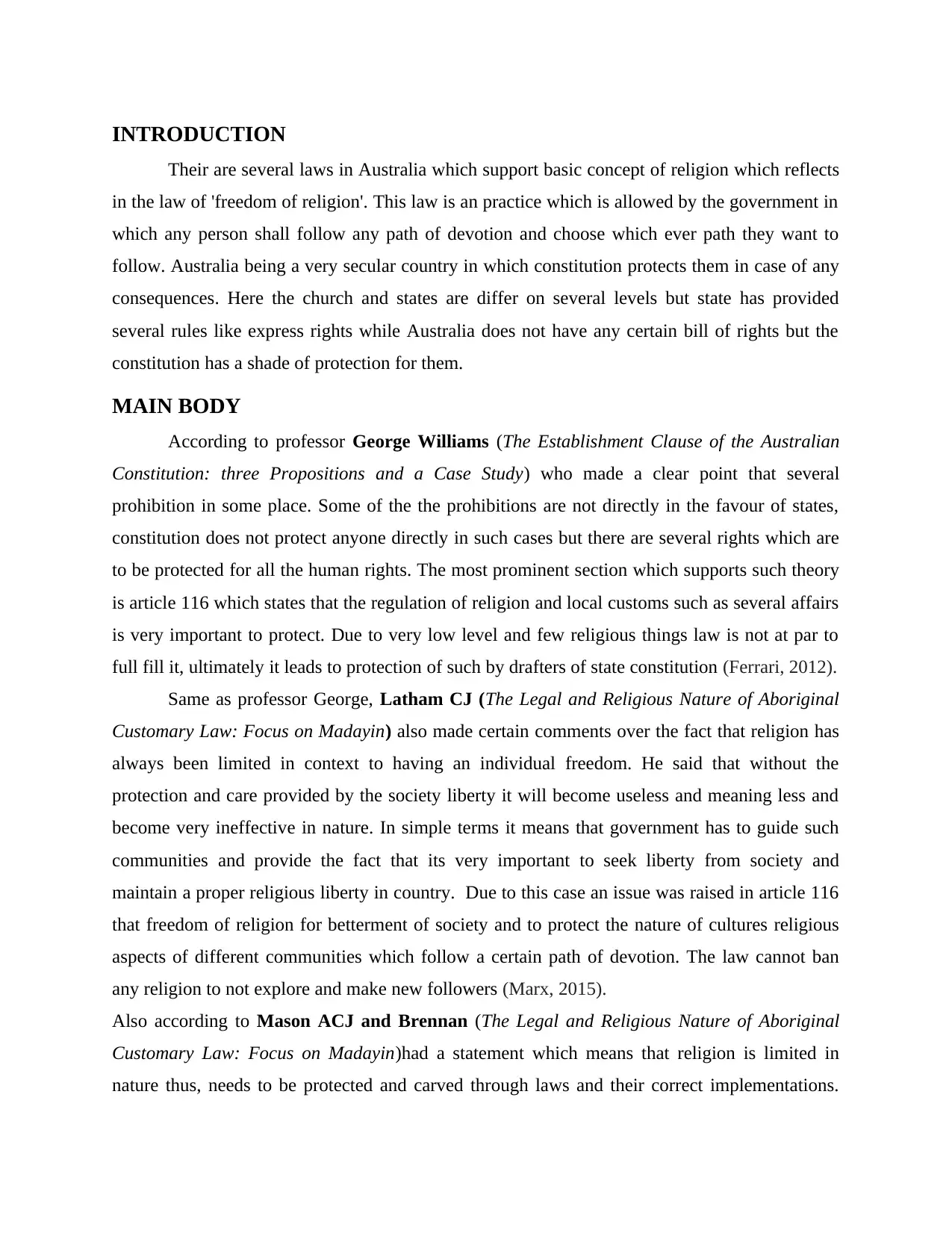
INTRODUCTION
Their are several laws in Australia which support basic concept of religion which reflects
in the law of 'freedom of religion'. This law is an practice which is allowed by the government in
which any person shall follow any path of devotion and choose which ever path they want to
follow. Australia being a very secular country in which constitution protects them in case of any
consequences. Here the church and states are differ on several levels but state has provided
several rules like express rights while Australia does not have any certain bill of rights but the
constitution has a shade of protection for them.
MAIN BODY
According to professor George Williams (The Establishment Clause of the Australian
Constitution: three Propositions and a Case Study) who made a clear point that several
prohibition in some place. Some of the the prohibitions are not directly in the favour of states,
constitution does not protect anyone directly in such cases but there are several rights which are
to be protected for all the human rights. The most prominent section which supports such theory
is article 116 which states that the regulation of religion and local customs such as several affairs
is very important to protect. Due to very low level and few religious things law is not at par to
full fill it, ultimately it leads to protection of such by drafters of state constitution (Ferrari, 2012).
Same as professor George, Latham CJ (The Legal and Religious Nature of Aboriginal
Customary Law: Focus on Madayin) also made certain comments over the fact that religion has
always been limited in context to having an individual freedom. He said that without the
protection and care provided by the society liberty it will become useless and meaning less and
become very ineffective in nature. In simple terms it means that government has to guide such
communities and provide the fact that its very important to seek liberty from society and
maintain a proper religious liberty in country. Due to this case an issue was raised in article 116
that freedom of religion for betterment of society and to protect the nature of cultures religious
aspects of different communities which follow a certain path of devotion. The law cannot ban
any religion to not explore and make new followers (Marx, 2015).
Also according to Mason ACJ and Brennan (The Legal and Religious Nature of Aboriginal
Customary Law: Focus on Madayin)had a statement which means that religion is limited in
nature thus, needs to be protected and carved through laws and their correct implementations.
Their are several laws in Australia which support basic concept of religion which reflects
in the law of 'freedom of religion'. This law is an practice which is allowed by the government in
which any person shall follow any path of devotion and choose which ever path they want to
follow. Australia being a very secular country in which constitution protects them in case of any
consequences. Here the church and states are differ on several levels but state has provided
several rules like express rights while Australia does not have any certain bill of rights but the
constitution has a shade of protection for them.
MAIN BODY
According to professor George Williams (The Establishment Clause of the Australian
Constitution: three Propositions and a Case Study) who made a clear point that several
prohibition in some place. Some of the the prohibitions are not directly in the favour of states,
constitution does not protect anyone directly in such cases but there are several rights which are
to be protected for all the human rights. The most prominent section which supports such theory
is article 116 which states that the regulation of religion and local customs such as several affairs
is very important to protect. Due to very low level and few religious things law is not at par to
full fill it, ultimately it leads to protection of such by drafters of state constitution (Ferrari, 2012).
Same as professor George, Latham CJ (The Legal and Religious Nature of Aboriginal
Customary Law: Focus on Madayin) also made certain comments over the fact that religion has
always been limited in context to having an individual freedom. He said that without the
protection and care provided by the society liberty it will become useless and meaning less and
become very ineffective in nature. In simple terms it means that government has to guide such
communities and provide the fact that its very important to seek liberty from society and
maintain a proper religious liberty in country. Due to this case an issue was raised in article 116
that freedom of religion for betterment of society and to protect the nature of cultures religious
aspects of different communities which follow a certain path of devotion. The law cannot ban
any religion to not explore and make new followers (Marx, 2015).
Also according to Mason ACJ and Brennan (The Legal and Religious Nature of Aboriginal
Customary Law: Focus on Madayin)had a statement which means that religion is limited in
nature thus, needs to be protected and carved through laws and their correct implementations.
⊘ This is a preview!⊘
Do you want full access?
Subscribe today to unlock all pages.

Trusted by 1+ million students worldwide
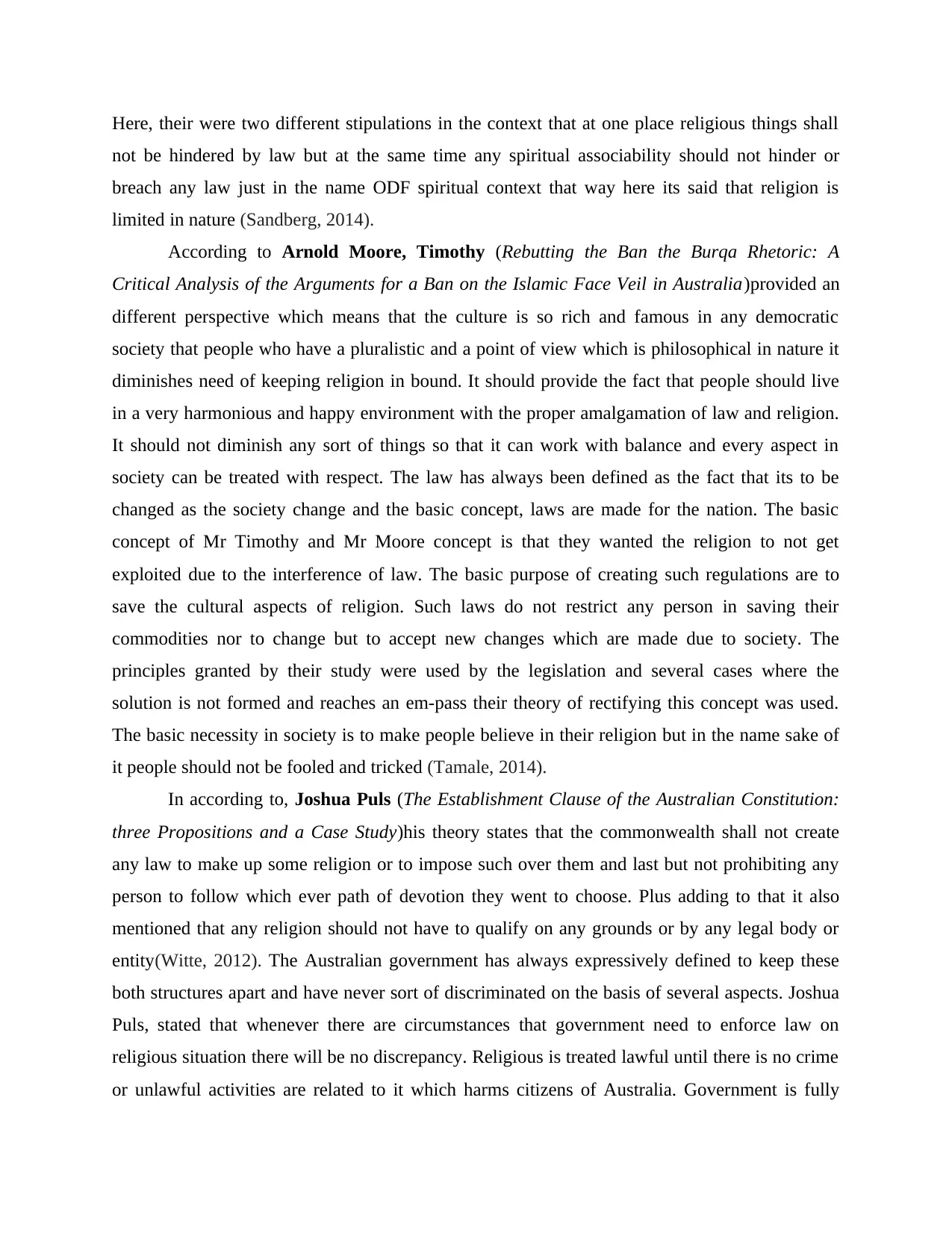
Here, their were two different stipulations in the context that at one place religious things shall
not be hindered by law but at the same time any spiritual associability should not hinder or
breach any law just in the name ODF spiritual context that way here its said that religion is
limited in nature (Sandberg, 2014).
According to Arnold Moore, Timothy (Rebutting the Ban the Burqa Rhetoric: A
Critical Analysis of the Arguments for a Ban on the Islamic Face Veil in Australia)provided an
different perspective which means that the culture is so rich and famous in any democratic
society that people who have a pluralistic and a point of view which is philosophical in nature it
diminishes need of keeping religion in bound. It should provide the fact that people should live
in a very harmonious and happy environment with the proper amalgamation of law and religion.
It should not diminish any sort of things so that it can work with balance and every aspect in
society can be treated with respect. The law has always been defined as the fact that its to be
changed as the society change and the basic concept, laws are made for the nation. The basic
concept of Mr Timothy and Mr Moore concept is that they wanted the religion to not get
exploited due to the interference of law. The basic purpose of creating such regulations are to
save the cultural aspects of religion. Such laws do not restrict any person in saving their
commodities nor to change but to accept new changes which are made due to society. The
principles granted by their study were used by the legislation and several cases where the
solution is not formed and reaches an em-pass their theory of rectifying this concept was used.
The basic necessity in society is to make people believe in their religion but in the name sake of
it people should not be fooled and tricked (Tamale, 2014).
In according to, Joshua Puls (The Establishment Clause of the Australian Constitution:
three Propositions and a Case Study)his theory states that the commonwealth shall not create
any law to make up some religion or to impose such over them and last but not prohibiting any
person to follow which ever path of devotion they went to choose. Plus adding to that it also
mentioned that any religion should not have to qualify on any grounds or by any legal body or
entity(Witte, 2012). The Australian government has always expressively defined to keep these
both structures apart and have never sort of discriminated on the basis of several aspects. Joshua
Puls, stated that whenever there are circumstances that government need to enforce law on
religious situation there will be no discrepancy. Religious is treated lawful until there is no crime
or unlawful activities are related to it which harms citizens of Australia. Government is fully
not be hindered by law but at the same time any spiritual associability should not hinder or
breach any law just in the name ODF spiritual context that way here its said that religion is
limited in nature (Sandberg, 2014).
According to Arnold Moore, Timothy (Rebutting the Ban the Burqa Rhetoric: A
Critical Analysis of the Arguments for a Ban on the Islamic Face Veil in Australia)provided an
different perspective which means that the culture is so rich and famous in any democratic
society that people who have a pluralistic and a point of view which is philosophical in nature it
diminishes need of keeping religion in bound. It should provide the fact that people should live
in a very harmonious and happy environment with the proper amalgamation of law and religion.
It should not diminish any sort of things so that it can work with balance and every aspect in
society can be treated with respect. The law has always been defined as the fact that its to be
changed as the society change and the basic concept, laws are made for the nation. The basic
concept of Mr Timothy and Mr Moore concept is that they wanted the religion to not get
exploited due to the interference of law. The basic purpose of creating such regulations are to
save the cultural aspects of religion. Such laws do not restrict any person in saving their
commodities nor to change but to accept new changes which are made due to society. The
principles granted by their study were used by the legislation and several cases where the
solution is not formed and reaches an em-pass their theory of rectifying this concept was used.
The basic necessity in society is to make people believe in their religion but in the name sake of
it people should not be fooled and tricked (Tamale, 2014).
In according to, Joshua Puls (The Establishment Clause of the Australian Constitution:
three Propositions and a Case Study)his theory states that the commonwealth shall not create
any law to make up some religion or to impose such over them and last but not prohibiting any
person to follow which ever path of devotion they went to choose. Plus adding to that it also
mentioned that any religion should not have to qualify on any grounds or by any legal body or
entity(Witte, 2012). The Australian government has always expressively defined to keep these
both structures apart and have never sort of discriminated on the basis of several aspects. Joshua
Puls, stated that whenever there are circumstances that government need to enforce law on
religious situation there will be no discrepancy. Religious is treated lawful until there is no crime
or unlawful activities are related to it which harms citizens of Australia. Government is fully
Paraphrase This Document
Need a fresh take? Get an instant paraphrase of this document with our AI Paraphraser
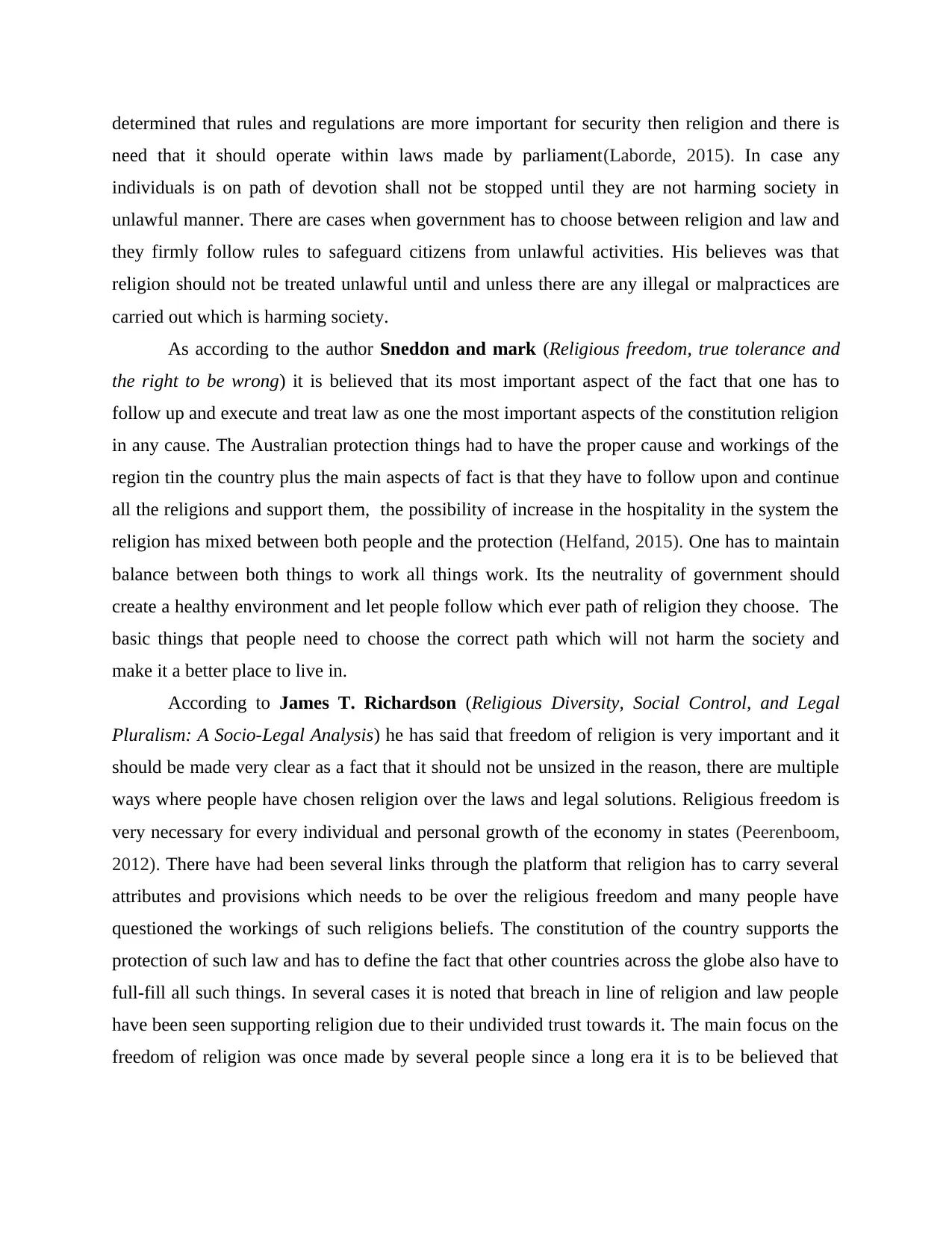
determined that rules and regulations are more important for security then religion and there is
need that it should operate within laws made by parliament(Laborde, 2015). In case any
individuals is on path of devotion shall not be stopped until they are not harming society in
unlawful manner. There are cases when government has to choose between religion and law and
they firmly follow rules to safeguard citizens from unlawful activities. His believes was that
religion should not be treated unlawful until and unless there are any illegal or malpractices are
carried out which is harming society.
As according to the author Sneddon and mark (Religious freedom, true tolerance and
the right to be wrong) it is believed that its most important aspect of the fact that one has to
follow up and execute and treat law as one the most important aspects of the constitution religion
in any cause. The Australian protection things had to have the proper cause and workings of the
region tin the country plus the main aspects of fact is that they have to follow upon and continue
all the religions and support them, the possibility of increase in the hospitality in the system the
religion has mixed between both people and the protection (Helfand, 2015). One has to maintain
balance between both things to work all things work. Its the neutrality of government should
create a healthy environment and let people follow which ever path of religion they choose. The
basic things that people need to choose the correct path which will not harm the society and
make it a better place to live in.
According to James T. Richardson (Religious Diversity, Social Control, and Legal
Pluralism: A Socio-Legal Analysis) he has said that freedom of religion is very important and it
should be made very clear as a fact that it should not be unsized in the reason, there are multiple
ways where people have chosen religion over the laws and legal solutions. Religious freedom is
very necessary for every individual and personal growth of the economy in states (Peerenboom,
2012). There have had been several links through the platform that religion has to carry several
attributes and provisions which needs to be over the religious freedom and many people have
questioned the workings of such religions beliefs. The constitution of the country supports the
protection of such law and has to define the fact that other countries across the globe also have to
full-fill all such things. In several cases it is noted that breach in line of religion and law people
have been seen supporting religion due to their undivided trust towards it. The main focus on the
freedom of religion was once made by several people since a long era it is to be believed that
need that it should operate within laws made by parliament(Laborde, 2015). In case any
individuals is on path of devotion shall not be stopped until they are not harming society in
unlawful manner. There are cases when government has to choose between religion and law and
they firmly follow rules to safeguard citizens from unlawful activities. His believes was that
religion should not be treated unlawful until and unless there are any illegal or malpractices are
carried out which is harming society.
As according to the author Sneddon and mark (Religious freedom, true tolerance and
the right to be wrong) it is believed that its most important aspect of the fact that one has to
follow up and execute and treat law as one the most important aspects of the constitution religion
in any cause. The Australian protection things had to have the proper cause and workings of the
region tin the country plus the main aspects of fact is that they have to follow upon and continue
all the religions and support them, the possibility of increase in the hospitality in the system the
religion has mixed between both people and the protection (Helfand, 2015). One has to maintain
balance between both things to work all things work. Its the neutrality of government should
create a healthy environment and let people follow which ever path of religion they choose. The
basic things that people need to choose the correct path which will not harm the society and
make it a better place to live in.
According to James T. Richardson (Religious Diversity, Social Control, and Legal
Pluralism: A Socio-Legal Analysis) he has said that freedom of religion is very important and it
should be made very clear as a fact that it should not be unsized in the reason, there are multiple
ways where people have chosen religion over the laws and legal solutions. Religious freedom is
very necessary for every individual and personal growth of the economy in states (Peerenboom,
2012). There have had been several links through the platform that religion has to carry several
attributes and provisions which needs to be over the religious freedom and many people have
questioned the workings of such religions beliefs. The constitution of the country supports the
protection of such law and has to define the fact that other countries across the globe also have to
full-fill all such things. In several cases it is noted that breach in line of religion and law people
have been seen supporting religion due to their undivided trust towards it. The main focus on the
freedom of religion was once made by several people since a long era it is to be believed that
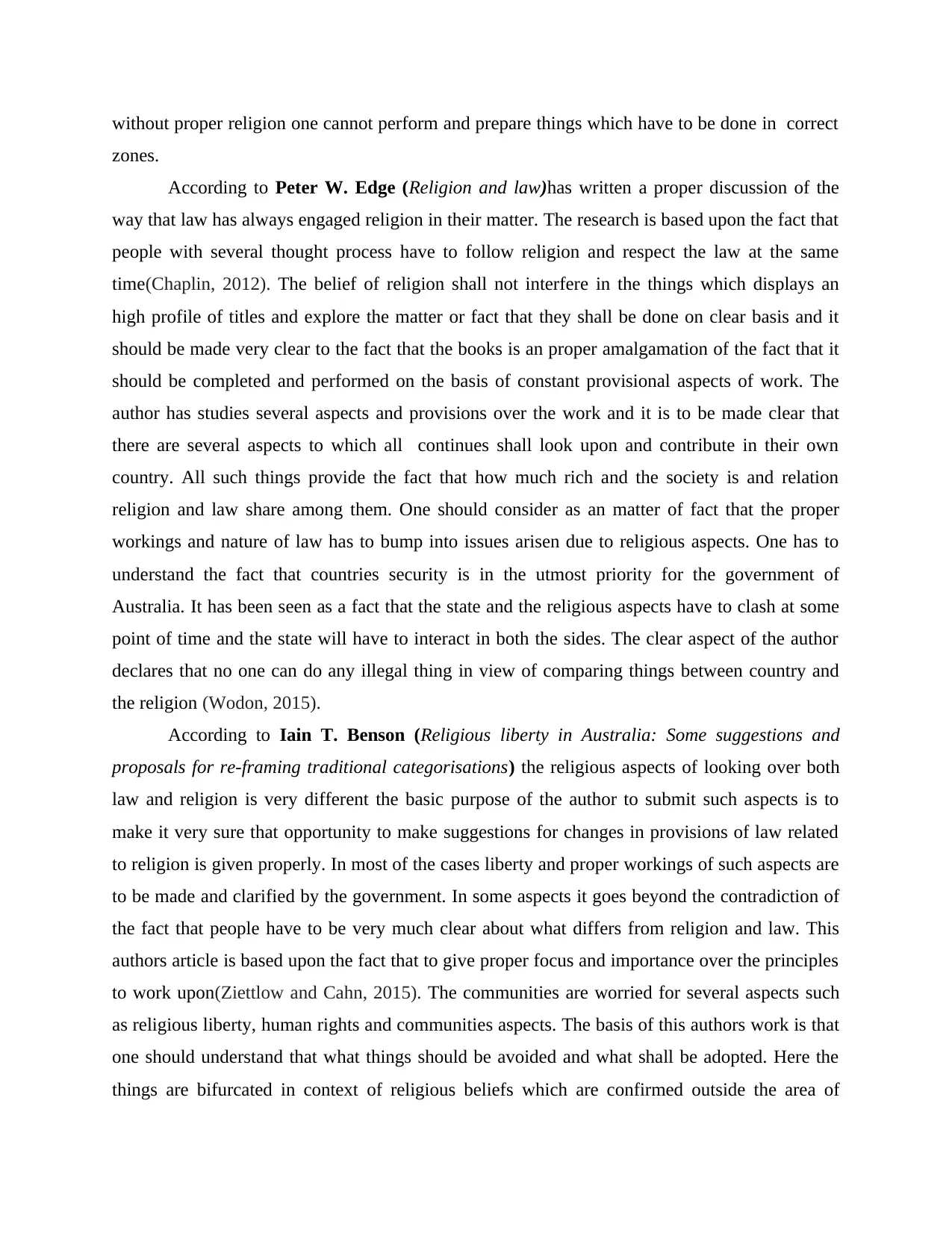
without proper religion one cannot perform and prepare things which have to be done in correct
zones.
According to Peter W. Edge (Religion and law)has written a proper discussion of the
way that law has always engaged religion in their matter. The research is based upon the fact that
people with several thought process have to follow religion and respect the law at the same
time(Chaplin, 2012). The belief of religion shall not interfere in the things which displays an
high profile of titles and explore the matter or fact that they shall be done on clear basis and it
should be made very clear to the fact that the books is an proper amalgamation of the fact that it
should be completed and performed on the basis of constant provisional aspects of work. The
author has studies several aspects and provisions over the work and it is to be made clear that
there are several aspects to which all continues shall look upon and contribute in their own
country. All such things provide the fact that how much rich and the society is and relation
religion and law share among them. One should consider as an matter of fact that the proper
workings and nature of law has to bump into issues arisen due to religious aspects. One has to
understand the fact that countries security is in the utmost priority for the government of
Australia. It has been seen as a fact that the state and the religious aspects have to clash at some
point of time and the state will have to interact in both the sides. The clear aspect of the author
declares that no one can do any illegal thing in view of comparing things between country and
the religion (Wodon, 2015).
According to Iain T. Benson (Religious liberty in Australia: Some suggestions and
proposals for re-framing traditional categorisations) the religious aspects of looking over both
law and religion is very different the basic purpose of the author to submit such aspects is to
make it very sure that opportunity to make suggestions for changes in provisions of law related
to religion is given properly. In most of the cases liberty and proper workings of such aspects are
to be made and clarified by the government. In some aspects it goes beyond the contradiction of
the fact that people have to be very much clear about what differs from religion and law. This
authors article is based upon the fact that to give proper focus and importance over the principles
to work upon(Ziettlow and Cahn, 2015). The communities are worried for several aspects such
as religious liberty, human rights and communities aspects. The basis of this authors work is that
one should understand that what things should be avoided and what shall be adopted. Here the
things are bifurcated in context of religious beliefs which are confirmed outside the area of
zones.
According to Peter W. Edge (Religion and law)has written a proper discussion of the
way that law has always engaged religion in their matter. The research is based upon the fact that
people with several thought process have to follow religion and respect the law at the same
time(Chaplin, 2012). The belief of religion shall not interfere in the things which displays an
high profile of titles and explore the matter or fact that they shall be done on clear basis and it
should be made very clear to the fact that the books is an proper amalgamation of the fact that it
should be completed and performed on the basis of constant provisional aspects of work. The
author has studies several aspects and provisions over the work and it is to be made clear that
there are several aspects to which all continues shall look upon and contribute in their own
country. All such things provide the fact that how much rich and the society is and relation
religion and law share among them. One should consider as an matter of fact that the proper
workings and nature of law has to bump into issues arisen due to religious aspects. One has to
understand the fact that countries security is in the utmost priority for the government of
Australia. It has been seen as a fact that the state and the religious aspects have to clash at some
point of time and the state will have to interact in both the sides. The clear aspect of the author
declares that no one can do any illegal thing in view of comparing things between country and
the religion (Wodon, 2015).
According to Iain T. Benson (Religious liberty in Australia: Some suggestions and
proposals for re-framing traditional categorisations) the religious aspects of looking over both
law and religion is very different the basic purpose of the author to submit such aspects is to
make it very sure that opportunity to make suggestions for changes in provisions of law related
to religion is given properly. In most of the cases liberty and proper workings of such aspects are
to be made and clarified by the government. In some aspects it goes beyond the contradiction of
the fact that people have to be very much clear about what differs from religion and law. This
authors article is based upon the fact that to give proper focus and importance over the principles
to work upon(Ziettlow and Cahn, 2015). The communities are worried for several aspects such
as religious liberty, human rights and communities aspects. The basis of this authors work is that
one should understand that what things should be avoided and what shall be adopted. Here the
things are bifurcated in context of religious beliefs which are confirmed outside the area of
⊘ This is a preview!⊘
Do you want full access?
Subscribe today to unlock all pages.

Trusted by 1+ million students worldwide
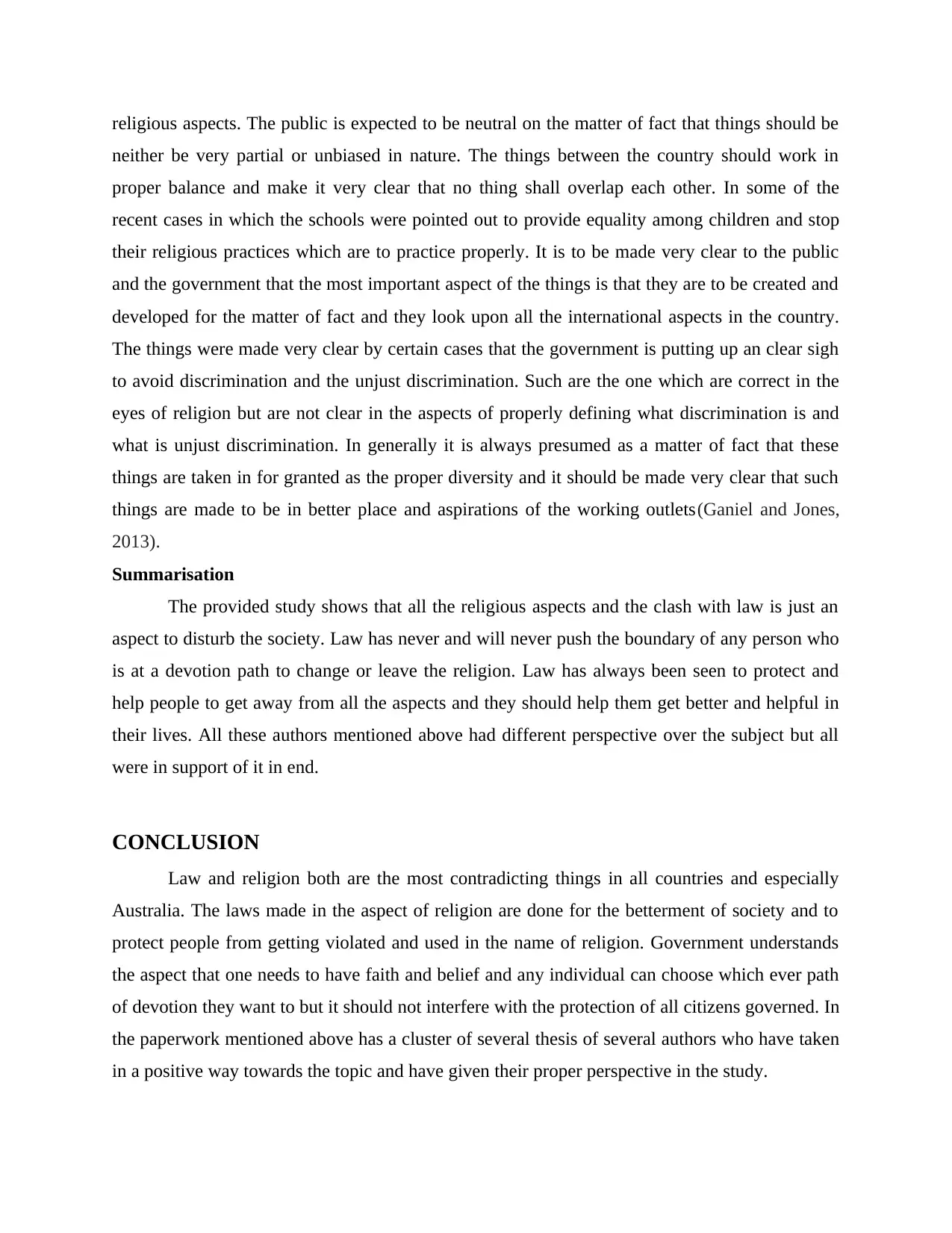
religious aspects. The public is expected to be neutral on the matter of fact that things should be
neither be very partial or unbiased in nature. The things between the country should work in
proper balance and make it very clear that no thing shall overlap each other. In some of the
recent cases in which the schools were pointed out to provide equality among children and stop
their religious practices which are to practice properly. It is to be made very clear to the public
and the government that the most important aspect of the things is that they are to be created and
developed for the matter of fact and they look upon all the international aspects in the country.
The things were made very clear by certain cases that the government is putting up an clear sigh
to avoid discrimination and the unjust discrimination. Such are the one which are correct in the
eyes of religion but are not clear in the aspects of properly defining what discrimination is and
what is unjust discrimination. In generally it is always presumed as a matter of fact that these
things are taken in for granted as the proper diversity and it should be made very clear that such
things are made to be in better place and aspirations of the working outlets(Ganiel and Jones,
2013).
Summarisation
The provided study shows that all the religious aspects and the clash with law is just an
aspect to disturb the society. Law has never and will never push the boundary of any person who
is at a devotion path to change or leave the religion. Law has always been seen to protect and
help people to get away from all the aspects and they should help them get better and helpful in
their lives. All these authors mentioned above had different perspective over the subject but all
were in support of it in end.
CONCLUSION
Law and religion both are the most contradicting things in all countries and especially
Australia. The laws made in the aspect of religion are done for the betterment of society and to
protect people from getting violated and used in the name of religion. Government understands
the aspect that one needs to have faith and belief and any individual can choose which ever path
of devotion they want to but it should not interfere with the protection of all citizens governed. In
the paperwork mentioned above has a cluster of several thesis of several authors who have taken
in a positive way towards the topic and have given their proper perspective in the study.
neither be very partial or unbiased in nature. The things between the country should work in
proper balance and make it very clear that no thing shall overlap each other. In some of the
recent cases in which the schools were pointed out to provide equality among children and stop
their religious practices which are to practice properly. It is to be made very clear to the public
and the government that the most important aspect of the things is that they are to be created and
developed for the matter of fact and they look upon all the international aspects in the country.
The things were made very clear by certain cases that the government is putting up an clear sigh
to avoid discrimination and the unjust discrimination. Such are the one which are correct in the
eyes of religion but are not clear in the aspects of properly defining what discrimination is and
what is unjust discrimination. In generally it is always presumed as a matter of fact that these
things are taken in for granted as the proper diversity and it should be made very clear that such
things are made to be in better place and aspirations of the working outlets(Ganiel and Jones,
2013).
Summarisation
The provided study shows that all the religious aspects and the clash with law is just an
aspect to disturb the society. Law has never and will never push the boundary of any person who
is at a devotion path to change or leave the religion. Law has always been seen to protect and
help people to get away from all the aspects and they should help them get better and helpful in
their lives. All these authors mentioned above had different perspective over the subject but all
were in support of it in end.
CONCLUSION
Law and religion both are the most contradicting things in all countries and especially
Australia. The laws made in the aspect of religion are done for the betterment of society and to
protect people from getting violated and used in the name of religion. Government understands
the aspect that one needs to have faith and belief and any individual can choose which ever path
of devotion they want to but it should not interfere with the protection of all citizens governed. In
the paperwork mentioned above has a cluster of several thesis of several authors who have taken
in a positive way towards the topic and have given their proper perspective in the study.
Paraphrase This Document
Need a fresh take? Get an instant paraphrase of this document with our AI Paraphraser
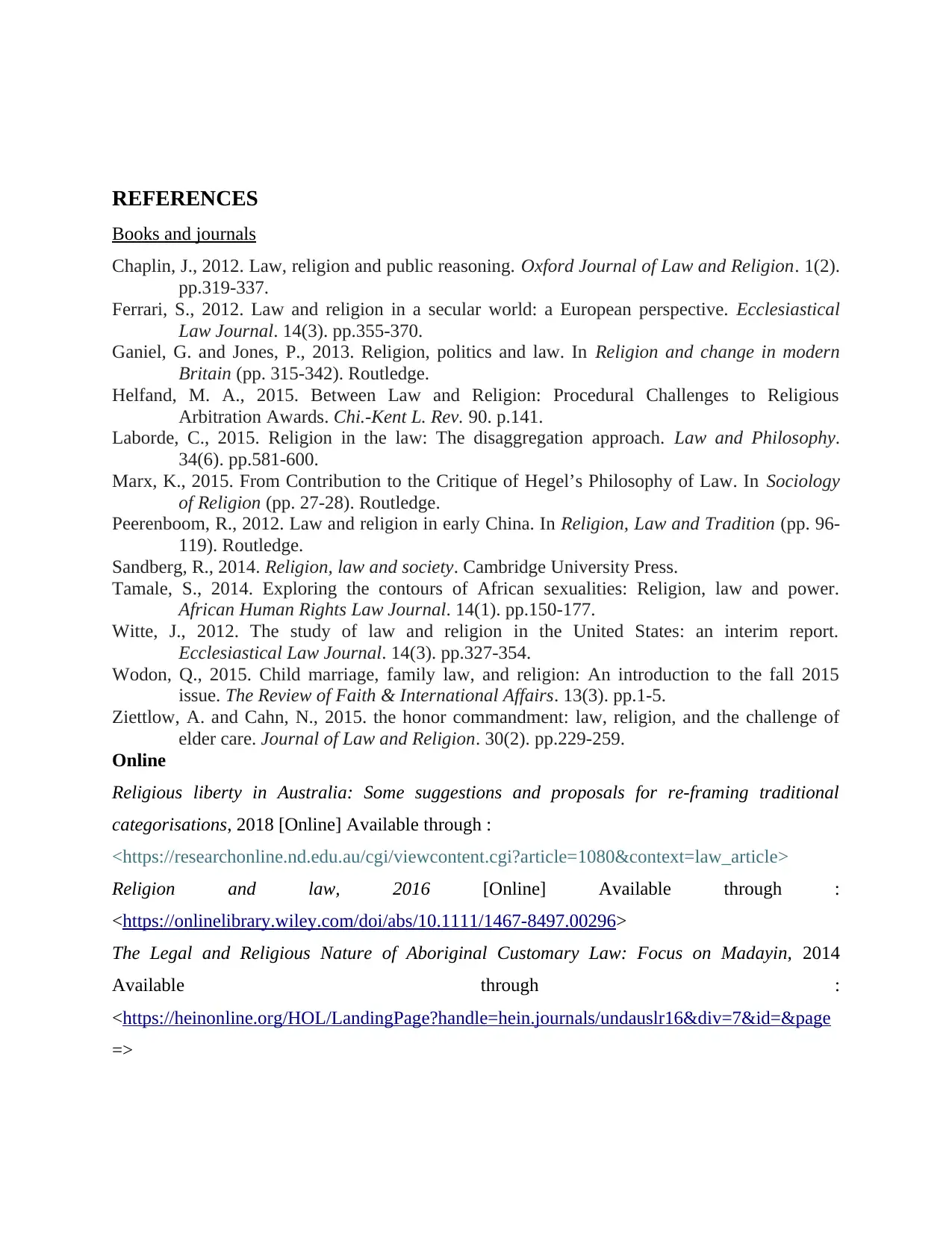
REFERENCES
Books and journals
Chaplin, J., 2012. Law, religion and public reasoning. Oxford Journal of Law and Religion. 1(2).
pp.319-337.
Ferrari, S., 2012. Law and religion in a secular world: a European perspective. Ecclesiastical
Law Journal. 14(3). pp.355-370.
Ganiel, G. and Jones, P., 2013. Religion, politics and law. In Religion and change in modern
Britain (pp. 315-342). Routledge.
Helfand, M. A., 2015. Between Law and Religion: Procedural Challenges to Religious
Arbitration Awards. Chi.-Kent L. Rev. 90. p.141.
Laborde, C., 2015. Religion in the law: The disaggregation approach. Law and Philosophy.
34(6). pp.581-600.
Marx, K., 2015. From Contribution to the Critique of Hegel’s Philosophy of Law. In Sociology
of Religion (pp. 27-28). Routledge.
Peerenboom, R., 2012. Law and religion in early China. In Religion, Law and Tradition (pp. 96-
119). Routledge.
Sandberg, R., 2014. Religion, law and society. Cambridge University Press.
Tamale, S., 2014. Exploring the contours of African sexualities: Religion, law and power.
African Human Rights Law Journal. 14(1). pp.150-177.
Witte, J., 2012. The study of law and religion in the United States: an interim report.
Ecclesiastical Law Journal. 14(3). pp.327-354.
Wodon, Q., 2015. Child marriage, family law, and religion: An introduction to the fall 2015
issue. The Review of Faith & International Affairs. 13(3). pp.1-5.
Ziettlow, A. and Cahn, N., 2015. the honor commandment: law, religion, and the challenge of
elder care. Journal of Law and Religion. 30(2). pp.229-259.
Online
Religious liberty in Australia: Some suggestions and proposals for re-framing traditional
categorisations, 2018 [Online] Available through :
<https://researchonline.nd.edu.au/cgi/viewcontent.cgi?article=1080&context=law_article>
Religion and law, 2016 [Online] Available through :
<https://onlinelibrary.wiley.com/doi/abs/10.1111/1467-8497.00296>
The Legal and Religious Nature of Aboriginal Customary Law: Focus on Madayin, 2014
Available through :
<https://heinonline.org/HOL/LandingPage?handle=hein.journals/undauslr16&div=7&id=&page
=>
Books and journals
Chaplin, J., 2012. Law, religion and public reasoning. Oxford Journal of Law and Religion. 1(2).
pp.319-337.
Ferrari, S., 2012. Law and religion in a secular world: a European perspective. Ecclesiastical
Law Journal. 14(3). pp.355-370.
Ganiel, G. and Jones, P., 2013. Religion, politics and law. In Religion and change in modern
Britain (pp. 315-342). Routledge.
Helfand, M. A., 2015. Between Law and Religion: Procedural Challenges to Religious
Arbitration Awards. Chi.-Kent L. Rev. 90. p.141.
Laborde, C., 2015. Religion in the law: The disaggregation approach. Law and Philosophy.
34(6). pp.581-600.
Marx, K., 2015. From Contribution to the Critique of Hegel’s Philosophy of Law. In Sociology
of Religion (pp. 27-28). Routledge.
Peerenboom, R., 2012. Law and religion in early China. In Religion, Law and Tradition (pp. 96-
119). Routledge.
Sandberg, R., 2014. Religion, law and society. Cambridge University Press.
Tamale, S., 2014. Exploring the contours of African sexualities: Religion, law and power.
African Human Rights Law Journal. 14(1). pp.150-177.
Witte, J., 2012. The study of law and religion in the United States: an interim report.
Ecclesiastical Law Journal. 14(3). pp.327-354.
Wodon, Q., 2015. Child marriage, family law, and religion: An introduction to the fall 2015
issue. The Review of Faith & International Affairs. 13(3). pp.1-5.
Ziettlow, A. and Cahn, N., 2015. the honor commandment: law, religion, and the challenge of
elder care. Journal of Law and Religion. 30(2). pp.229-259.
Online
Religious liberty in Australia: Some suggestions and proposals for re-framing traditional
categorisations, 2018 [Online] Available through :
<https://researchonline.nd.edu.au/cgi/viewcontent.cgi?article=1080&context=law_article>
Religion and law, 2016 [Online] Available through :
<https://onlinelibrary.wiley.com/doi/abs/10.1111/1467-8497.00296>
The Legal and Religious Nature of Aboriginal Customary Law: Focus on Madayin, 2014
Available through :
<https://heinonline.org/HOL/LandingPage?handle=hein.journals/undauslr16&div=7&id=&page
=>
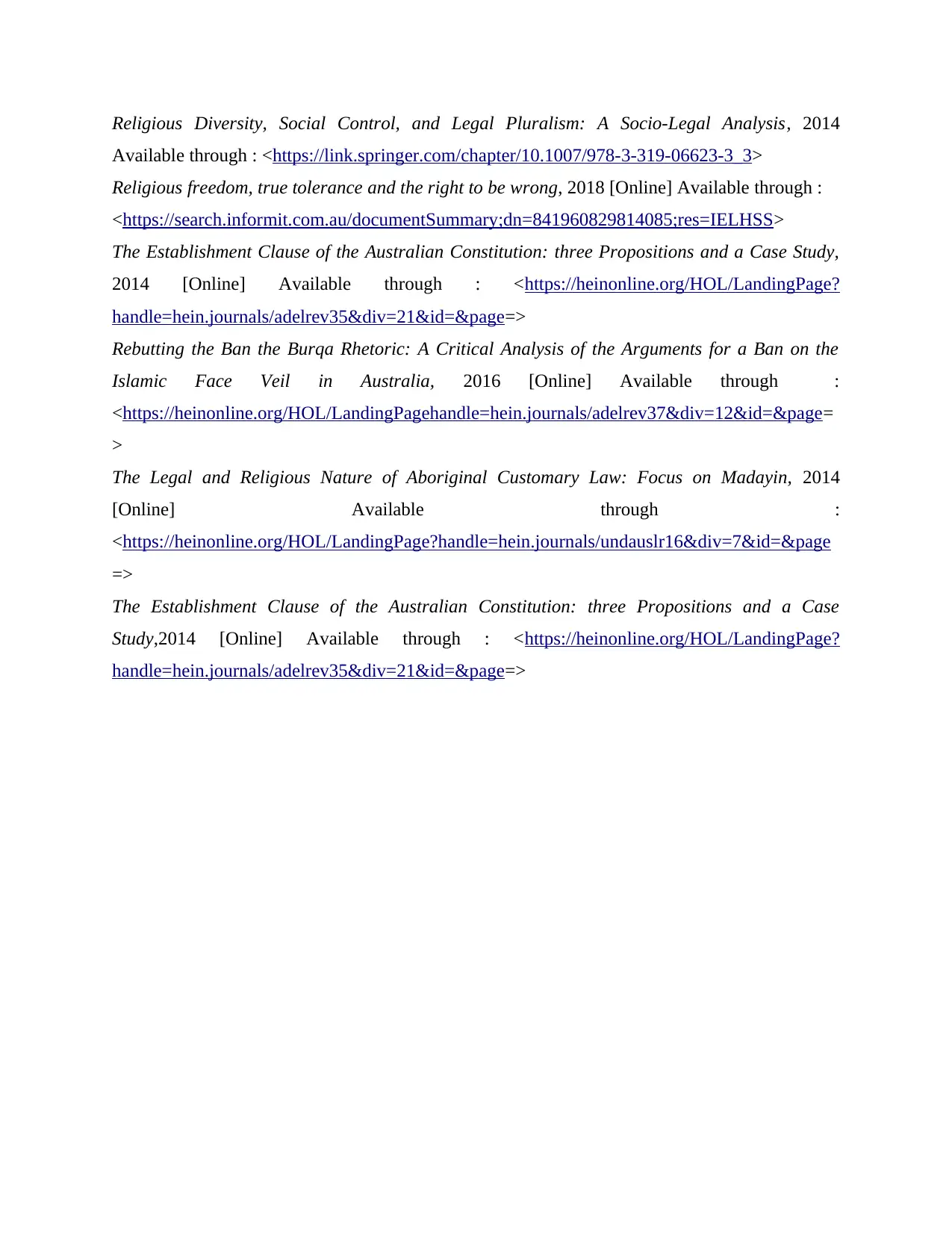
Religious Diversity, Social Control, and Legal Pluralism: A Socio-Legal Analysis, 2014
Available through : <https://link.springer.com/chapter/10.1007/978-3-319-06623-3_3>
Religious freedom, true tolerance and the right to be wrong, 2018 [Online] Available through :
<https://search.informit.com.au/documentSummary;dn=841960829814085;res=IELHSS>
The Establishment Clause of the Australian Constitution: three Propositions and a Case Study,
2014 [Online] Available through : <https://heinonline.org/HOL/LandingPage?
handle=hein.journals/adelrev35&div=21&id=&page=>
Rebutting the Ban the Burqa Rhetoric: A Critical Analysis of the Arguments for a Ban on the
Islamic Face Veil in Australia, 2016 [Online] Available through :
<https://heinonline.org/HOL/LandingPagehandle=hein.journals/adelrev37&div=12&id=&page=
>
The Legal and Religious Nature of Aboriginal Customary Law: Focus on Madayin, 2014
[Online] Available through :
<https://heinonline.org/HOL/LandingPage?handle=hein.journals/undauslr16&div=7&id=&page
=>
The Establishment Clause of the Australian Constitution: three Propositions and a Case
Study,2014 [Online] Available through : <https://heinonline.org/HOL/LandingPage?
handle=hein.journals/adelrev35&div=21&id=&page=>
Available through : <https://link.springer.com/chapter/10.1007/978-3-319-06623-3_3>
Religious freedom, true tolerance and the right to be wrong, 2018 [Online] Available through :
<https://search.informit.com.au/documentSummary;dn=841960829814085;res=IELHSS>
The Establishment Clause of the Australian Constitution: three Propositions and a Case Study,
2014 [Online] Available through : <https://heinonline.org/HOL/LandingPage?
handle=hein.journals/adelrev35&div=21&id=&page=>
Rebutting the Ban the Burqa Rhetoric: A Critical Analysis of the Arguments for a Ban on the
Islamic Face Veil in Australia, 2016 [Online] Available through :
<https://heinonline.org/HOL/LandingPagehandle=hein.journals/adelrev37&div=12&id=&page=
>
The Legal and Religious Nature of Aboriginal Customary Law: Focus on Madayin, 2014
[Online] Available through :
<https://heinonline.org/HOL/LandingPage?handle=hein.journals/undauslr16&div=7&id=&page
=>
The Establishment Clause of the Australian Constitution: three Propositions and a Case
Study,2014 [Online] Available through : <https://heinonline.org/HOL/LandingPage?
handle=hein.journals/adelrev35&div=21&id=&page=>
⊘ This is a preview!⊘
Do you want full access?
Subscribe today to unlock all pages.

Trusted by 1+ million students worldwide

1 out of 10
Related Documents
Your All-in-One AI-Powered Toolkit for Academic Success.
+13062052269
info@desklib.com
Available 24*7 on WhatsApp / Email
![[object Object]](/_next/static/media/star-bottom.7253800d.svg)
Unlock your academic potential
Copyright © 2020–2025 A2Z Services. All Rights Reserved. Developed and managed by ZUCOL.





